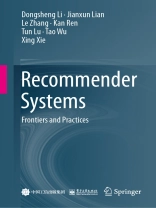This book starts from the classic recommendation algorithms, introduces readers to the basic principles and main concepts of the traditional algorithms, and analyzes their advantages and limitations. Then, it addresses the fundamentals of deep learning, focusing on the deep-learning-based technology used, and analyzes problems arising in the theory and practice of recommender systems, helping readers gain a deeper understanding of the cutting-edge technology used in these systems. Lastly, it shares practical experience with Microsoft ’s open source project Microsoft Recommenders. Readers can learn the design principles of recommendation algorithms using the source code provided in this book, allowing them to quickly build accurate and efficient recommender systems from scratch.
Inhaltsverzeichnis
Chapter 1. Overview of Recommender Systems.- Chapter 2. Classic Recommendation Algorithms.- Chapter 3. Foundations of Deep Learning.- Chapter 4. Deep Learning-based Recommendation Algorithms.- Chapter 5. Recommender System Frontier Topics. Chapter 6. Practical Recommender System.- Chapter 7. Summary and Outlook
Über den Autor
Dongsheng Li has been a principal research manager with Microsoft Research Asia (MSRA) since February 2020. His research interests include recommender systems and general machine learning applications. He has published over 100 papers in top-tier conferences and journals and has served as a program committee member for leading conferences.
Dr. Jianxun Lian graduated from the University of Science and Technology of China and is currently a senior researcher with Microsoft Research Asia. His research interests mainly include recommendation systems, user modeling, and deep-learning-related technologies.Le Zhang is a machine learning architect with Standard Chartered Bank. He has extensive experience in applying cutting-edge machine learning and artificial intelligence technology to accelerate digital transformation for enterprises and start-ups.
Kan Ren is a senior researcher with Microsoft Research. His main research interests include spatiotemporal data mining, reasoning, and decision optimization with applications in healthcare, recommender systems, and finance. Kan has published many papers in top-tier conferences on machine learning and data mining.
Tun LU is currently a full professor with the School of Computer Science, Fudan University, China. His research interests include computer-supported cooperative work (CSCW), social computing, recommender systems, and human–computer interaction (HCI). He has published more than 80 peer-reviewed publications in prestigious conferences and journals.
Tao Wu is a Principal Applied Science Manager at Microsoft’s Business Applications and Platform Group, and leading product development efforts utilizing large language models and generative AI. He spearheaded the creation of the Microsoft Recommenders project (recently donated to the Linux Foundation), which has become one of the most popular open source projects on recommender systems. Prior to Microsoft, Tao held various research, engineering and leadership positions at Nokia Research Center and MIT CSAIL.
Dr. Xing Xie is currently a senior principal research manager with Microsoft Research Asia. In the past several years, he has published over 300 papers, won the 2022 ACM SIGKDD 2022 Test-of-Time Award and 2021 ACM SIGKDD China Test-of-Time Award, received the 10-Year Impact Award (honorable mention) at ACM SIGSPATIAL 2020, and won the 10-Year Impact Award at ACM SIGSPATIAL 2019. He currently serves on the editorial boards of ACM Transactions on Recommender Systems (To RS), ACM Transactions on Social Computing (TSC), and ACM Transactions on Intelligent Systems and Technology (TIST).












